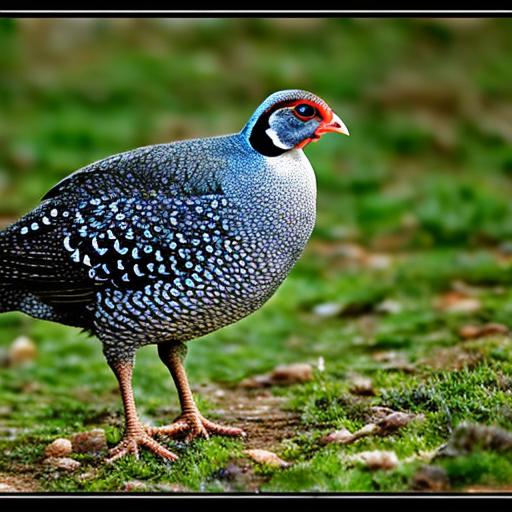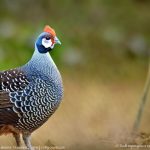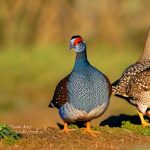Guinea fowl, also known as pintades, are a type of poultry that are native to Africa. They are known for their distinctive appearance, with speckled feathers and a helmet-like crest on their heads. Guinea fowl are popular for their ability to control pests such as ticks, flies, and other insects, making them a valuable addition to any farm or homestead. They are also prized for their flavorful meat, which is lean and rich in nutrients. Guinea fowl are social birds that thrive in small flocks, and they are known for their loud calls and alert nature, making them excellent watchdogs for your property.
Guinea fowl are hardy birds that can adapt to a wide range of climates, making them suitable for keeping in various regions. They are also relatively low-maintenance compared to other types of poultry, making them an attractive option for those looking to raise birds for meat or pest control. With the right care and attention, guinea fowl can thrive and provide numerous benefits to their owners.
Key Takeaways
- Guinea fowl are hardy, low-maintenance birds that are great for pest control and as a source of meat and eggs.
- Guinea fowl require at least 3 square feet of space per bird in their living area to thrive and stay healthy.
- Guinea fowl have specific dietary needs and require a balanced diet of commercial feed, grains, and access to insects and greens.
- Guinea fowl need a secure and well-ventilated coop or shelter to protect them from predators and the elements.
- Guinea fowl are social birds that thrive in flocks and have unique behaviors that should be considered when keeping them.
Space Requirements for Guinea Fowl
When it comes to space requirements for guinea fowl, it’s important to provide them with enough room to roam and forage. Guinea fowl are active birds that enjoy exploring their surroundings, so they will need a large outdoor area to roam during the day. A general rule of thumb is to provide at least 3-4 square feet of space per bird in the coop or shelter, and at least 250-400 square feet of outdoor space per bird. This will ensure that the guinea fowl have enough room to move around and engage in natural behaviors such as dust bathing and foraging for insects.
It’s also important to provide adequate protection from predators, as guinea fowl are vulnerable to attacks from predators such as foxes, raccoons, and birds of prey. A secure coop or shelter with a roof is essential to keep the guinea fowl safe at night, and a fenced outdoor area will help to keep them safe during the day. Providing plenty of hiding spots and perches within the outdoor space can also help the guinea fowl feel secure and reduce stress.
Feeding and Nutrition for Guinea Fowl
Feeding guinea fowl a balanced diet is essential for their health and well-being. Guinea fowl are omnivores and enjoy a varied diet that includes grains, seeds, fruits, vegetables, and insects. A commercial game bird feed can provide a good base for their diet, and supplementing with fresh fruits and vegetables can help to provide additional nutrients. It’s important to provide access to grit or small stones, which guinea fowl use to help grind up their food in their gizzards.
In addition to their regular diet, guinea fowl also enjoy foraging for insects and other small creatures. Allowing them access to a large outdoor area where they can hunt for bugs and other tasty treats will help to keep them healthy and engaged. It’s important to monitor their food intake and adjust their diet as needed based on their activity level and overall health.
Housing and Shelter for Guinea Fowl
When it comes to housing and shelter for guinea fowl, it’s important to provide a secure and comfortable environment for them to roost at night and seek shelter from the elements. A well-ventilated coop or shelter with plenty of roosting space is essential for keeping guinea fowl safe and comfortable at night. The coop should be predator-proof, with sturdy walls and a secure door that can be closed at night to keep the birds safe from predators.
In addition to a secure coop, it’s important to provide a spacious outdoor area where the guinea fowl can roam during the day. This outdoor area should be fenced to keep the birds safe from predators and provide plenty of room for them to forage and engage in natural behaviors. Providing hiding spots such as bushes or shrubs within the outdoor area can also help the guinea fowl feel secure and reduce stress.
Behavioral Considerations for Keeping Guinea Fowl
Guinea fowl are social birds that thrive in small flocks, so it’s important to keep at least two or three birds together to prevent loneliness and stress. They are also known for their loud calls and alert nature, which can make them excellent watchdogs for your property. However, their loud calls can be disruptive in residential areas, so it’s important to consider your neighbors when keeping guinea fowl.
Guinea fowl are active birds that enjoy exploring their surroundings and engaging in natural behaviors such as dust bathing and foraging for insects. Providing plenty of room for them to roam and access to a varied diet will help to keep them healthy and engaged. It’s also important to provide plenty of hiding spots within their outdoor area, as guinea fowl can be skittish and may become stressed if they feel exposed.
Health and Care for Guinea Fowl

Keeping guinea fowl healthy requires regular monitoring and attention to their overall well-being. It’s important to provide access to clean water at all times, as guinea fowl can be prone to heat stress in hot weather. Regularly cleaning their coop or shelter will help to prevent the buildup of bacteria and parasites that can lead to illness.
Guinea fowl are generally hardy birds, but they can be susceptible to certain diseases such as coccidiosis and respiratory infections. It’s important to monitor their behavior and appearance for any signs of illness, such as lethargy, loss of appetite, or abnormal droppings. Providing regular veterinary care and vaccinations can help to prevent common illnesses and keep the guinea fowl healthy.
Can You Keep Guinea Fowl in Your Yard?
In conclusion, keeping guinea fowl in your yard can be a rewarding experience if you have the space and resources to accommodate their needs. Guinea fowl are hardy birds that can provide numerous benefits such as pest control and flavorful meat. However, it’s important to consider their space requirements, feeding and nutrition needs, housing and shelter requirements, behavioral considerations, and health care needs before deciding to keep guinea fowl.
Providing a spacious outdoor area with plenty of room for the guinea fowl to roam and engage in natural behaviors is essential for their well-being. Additionally, ensuring access to a balanced diet, clean water, and regular veterinary care will help to keep the guinea fowl healthy and thriving. With the right care and attention, guinea fowl can be a valuable addition to your yard or farm.
If you’re considering keeping guinea fowl in your yard, you may also be interested in learning how to turn a shed into a chicken coop. This article from Poultry Wizard provides valuable insights and tips on transforming a shed into a suitable living space for chickens. Check it out here to discover practical advice for creating a comfortable and secure environment for your feathered friends.
FAQs
What are guinea fowl?
Guinea fowl are a type of bird that are native to Africa. They are known for their distinctive appearance, with speckled feathers and a helmet-like crest on their heads.
Can guinea fowl be kept in a yard?
Yes, guinea fowl can be kept in a yard. They are often kept on farms and in rural areas for their pest control abilities and for their meat and eggs.
What do guinea fowl eat?
Guinea fowl are omnivores and will eat a variety of foods, including insects, seeds, and small plants. They are also known to be effective at controlling pests such as ticks and grasshoppers.
Do guinea fowl require a lot of space?
Guinea fowl do not require a large amount of space, but they do need room to roam and forage. A yard with some open space and access to grass and insects is suitable for keeping guinea fowl.
Are guinea fowl noisy?
Guinea fowl are known for their loud calls, which can be quite noisy, especially during mating season. However, some people find their calls to be charming and enjoy having them around.
Do guinea fowl need a coop?
Guinea fowl do not necessarily need a traditional coop like chickens, but they do need a sheltered area to roost at night and to protect them from predators. A simple shelter or enclosed area will suffice for guinea fowl.
Meet Walter, the feathered-friend fanatic of Florida! Nestled in the sunshine state, Walter struts through life with his feathered companions, clucking his way to happiness. With a coop that’s fancier than a five-star hotel, he’s the Don Juan of the chicken world. When he’s not teaching his hens to do the cha-cha, you’ll find him in a heated debate with his prized rooster, Sir Clucks-a-Lot. Walter’s poultry passion is no yolk; he’s the sunny-side-up guy you never knew you needed in your flock of friends!







